Cloth Diapers vs Disposable Diapers: A Side by Side Comparison
As an Amazon Associate, Ecotero earns from qualifying purchases.
Today, we will answer the question, “cloth diapers vs disposable diapers: which is the better solution to your baby’s stinky bum?”
Eco-conscious parents claim that cloth diapers are the clear winners because they take good care of your baby’s pee and poo while reducing waste in landfills.
On the other corner, pro disposable diaper parents make the case that washing cloth diapers contribute to more water and electric consumption.
Not to mention disposable diapers are very convenient to use and more absorbent than cloth diapers.
So, are cloth diapers better than disposable diapers, or is it the other way around?
Well, you won’t have to second-guess anymore.
We prepared an unbiased side by side comparison of the two in 5 different categories, and you be the judge.
Ready your scorecards.
Cloth Diapers vs Disposable Diapers Comparison Table
| Category | Better Diaper |
|---|---|
| Convenience | Disposable Diaper |
| Safety | Cloth Diaper |
| Leak Protection | Disposable Diaper |
| Cost | Cloth Diaper |
| Overall Eco-friendliness | Cloth Diaper |
1. Cloth Diapers vs Disposable Diapers, which is more convenient?
In terms of convenience alone, disposable diapers are more convenient to use.
All disposable diapers are ready to wear. You simply have to put them on your baby, close the Velcro or snap closures, and you’re done.
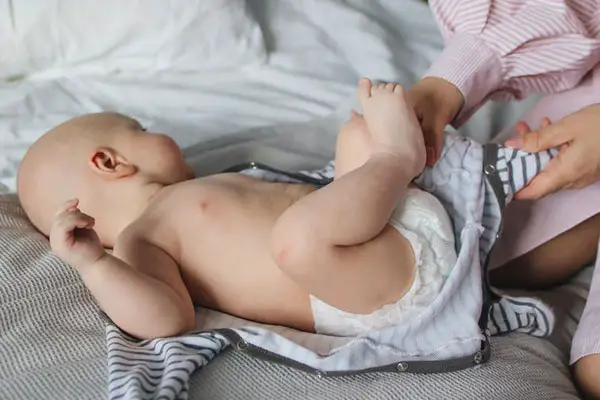
Once it’s full (with pee) or your baby pooped on it, you simply remove it and toss it in the trash.
Meanwhile, there are different kinds of cloth diapers.
The five most common types of cloth diapers are Flat & Prefolds, Fitted, Pocket, Hybrid, and All-in-One (AIO) cloth diapers.
Aside from all-in-one, other types of cloth diapers will require some preparation, insertion of liners, folding, and using clips and fasteners to ensure that they don’t come off from your baby’s bum.
Some cloth diapers are also not waterproof, so you’ll have to purchase a separate diaper cover to prevent leakage.
And since the best selling point of cloth diapers are reusability, you might actually need to manually scoop some poop out of cloth diapers before you can wash, dry, and reuse them later.
Unfortunately for some parents, taking care of their baby alone is already a handful.
Imagine having dozens of cloth diapers that need to be consistently prepared, properly washed, and dried to remain usable.
Cloth diapers are also impractical for babies who will be entrusted to a caregiver, daycare, or left to their grandparents.
2. Are Cloth Diapers Safer for Babies than Disposable Diapers?
Both cloth and disposable diapers are generally safe for babies; otherwise, they won’t be approved to be used by the public. Wouldn’t you agree?
But some people favor cloth diapers because many cloth diapers are made only using natural fibers from plants.
Most cloth diapers are also free from chlorine, latex, perfumes, and dyes – common ingredients you can find in traditional disposable diapers.
To be fair, many disposable diapers today are also free from irritants and harsh chemicals.
This is especially true in the case of biodegradable disposable diapers.
But we would love to hear your opinion.
Which do you think is generally safer for a baby’s sensitive tush? A cloth diaper or a disposable diaper?
3. Do Cloth Diapers Leak More than Disposable Diapers?
Many people often generally assume that, like disposable diapers, cloth diapers are also waterproof.
Unfortunately, only certain types of cloth diapers are waterproof.
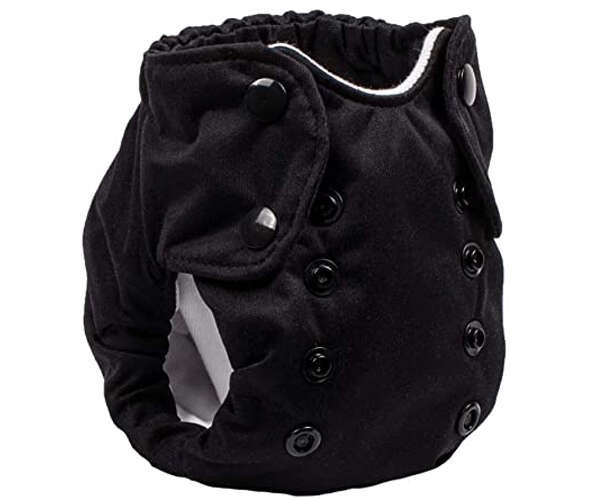
Some cloth diapers don’t have waterproof covers; hence, if you’re not too careful to recognize which is which, you’ll risk getting leaks and stains on your sheets.
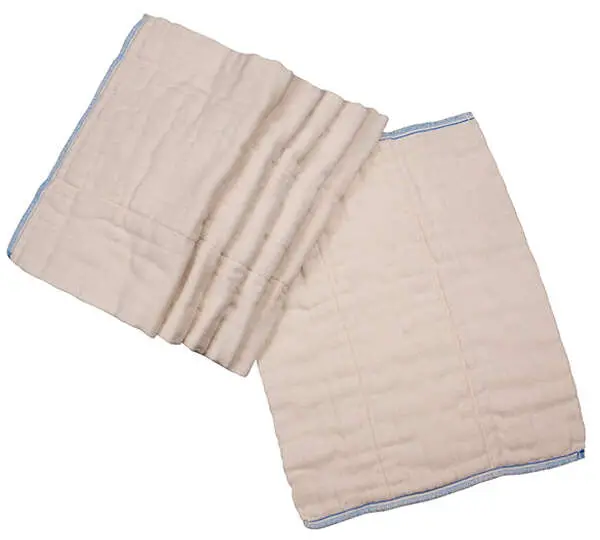
Many parents also say that cloth diapers are less absorbent than disposable diapers.
This is probably because cloth diapers are made using only natural plant fibers.
Unlike typical disposable diapers, cloth diapers do not contain absorbent gels and chemical crystals that absorb liquids when wet.
4. Do you really Save Money using Cloth Diapers?
The financial benefits of cloth diapers vary from one parent to another.
For starters, there are many types of cloth diapers.
So the initial investment parents need to put up will depend on the cloth diaper type they choose.
The cheapest type of cloth diapers are flat and prefolds, while all-in-ones are the most costly.
Secondly, cloth diapers are typically less absorbent than disposable diapers.
So, depending on your little angel’s poop and pee schedules, you might need to purchase at least two dozen cloth diapers in bulk to keep your baby dry and clean.
Other than the first two things above, you’re expenses using cloth diaper also depends on these other factors:
- How often do you plan to wash the cloth diapers?
- Will you dry cloth diapers using the sun or a machine dryer?
- Will you wash the soiled cloth diapers manually, using a machine or a diaper service?
- What laundry detergents are you using?
On the bright side, cloth diapers are often durable and designed to serve more than one child.
So if you take care of your cloth diaper, you can reuse it for your other kids in the future.
You can also sell used cloth diapers to other parents who want to reduce disposable diaper waste in landfills.
5. Environmental Impact of Cloth Diapers vs Disposable Diapers
Materials & Production
According to research, 70 percent of a typical disposable diaper is made of paper from trees, while the other parts are often derived from petroleum.
On the other hand, cloth diapers are often made using sustainable plant fibers like bamboo, hemp, and cotton.
However, cloth diapers aren’t exactly 100% green either.
For instance, cotton cultivation involves heavy usage of pesticides, fertilizer, and water.
Meanwhile, production of bamboo viscose (aka bamboo rayon) has a horrifying effect on the environment and the workers’ health.`
Carbon Emissions
Both cloth and disposable diapers contribute to carbon emissions.
This is during the time the raw materials are transported, processed, and when the final product is finally delivered to stores and in consumers’ houses.
Waste Disposal
Around 20 billion disposable diapers are dumped in landfills each year in the US alone.
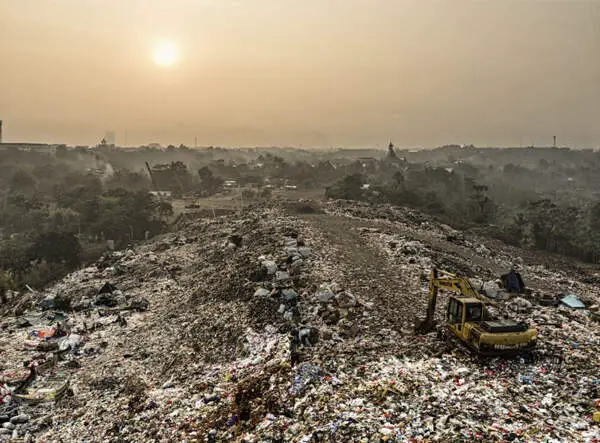
Worse, it takes between 250-500 years for a typical disposable diaper to decompose in landfills fully.
If nothing is done, it won’t take long before soiled diapers overrun our planet.
Moreover, the American Public Health Association stated that disposing of human feces in a landfill could introduce different viruses in groundwater systems.
And while using cloth diapers helps reduce the number of disposable diapers in landfills, some people voice their concerns about the “other” environmental impact of cloth diapers.
Some people claim that cloth diapers can contribute to water pollution and endangers marine organisms depending on the detergents used when washing them.
Furthermore, some parents might machine wash cloth diapers in half-loads to avoid running out of clean ones, which will cause more electric consumption.
Nevertheless, we would like to award an eco-friendly point to cloth diapers given that they are completely washable and reusable.
Thus, minimizing the waste in landfills.
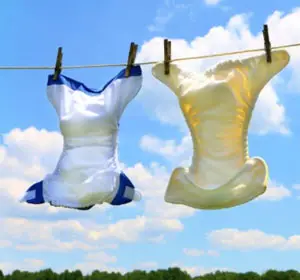
But this is our opinion, and you are welcome to weigh in and share your thoughts in the comments below.
What are the Advantages and Disadvantages of Cloth Diapers and Disposable Diapers?
Cloth Diapers Pros & Cons
PROS
- Made of natural plant fibers
- Free from dyes and other irritants
- Budget-friendly on the long haul
CONS
- Might need folding and fasteners (unless you use AIOs)
- Needs constant and proper washing
- Additional electricity and water consumption
Check out the best cloth diapers for babies.
Disposable Diapers Pros & Cons
PROS
- Very convenient to use
- You get more sizing options
- Highly absorbent
CONS
- It might contain irritants that can irritate some babies
- Contributes to tons of waste in landfills
- More costly to maintain
Check out the best disposable and biodegradable diapers for babies.
Conclusion
Before deciding whether to use cloth or disposable for your baby, take the time to consider your time, lifestyle, and the things we’ve discussed above.
For example, cloth diapering might have done wonders to other parents but it might not be the case for you, and vice versa.
But the good news is, diapering your kid doesn’t have to be all or nothing.
If you’re at home and have plenty of time to wash dirty diapers, you can use cloth diapers.
If you have a busy schedule or you’re going on a trip, use disposable diapers.
But make sure you get a biodegradable type of disposable diaper since they decompose much faster in landfills.
In the end, what matters is choosing the best diaper that will give comfort to your baby without complicating your lifestyle.
So, which do you think is better for your baby, cloth diapers or disposable diapers?

Good resource. I specially love the info about the pros and cons of cloth diapering. Many thanks.